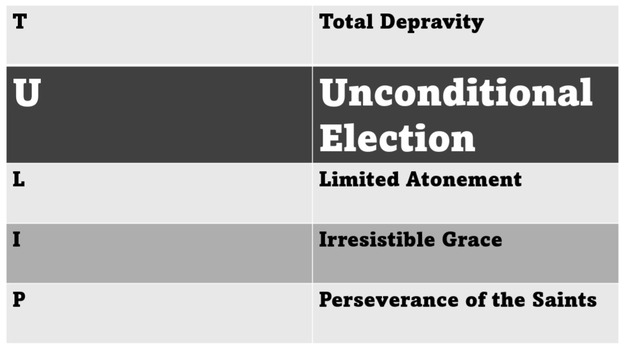Calvinism’s TULIP: Why Affirm Unconditional Election?
Why Affirm Unconditional Election? Welcome to the second post in our series on TULIP, the five points of Calvinism that form the backbone of Reformed theology. In this series, we’re hoping to make a compelling, biblical case for each of these five doctrines that are often considered difficult yet, are profoundly important. The acronym TULIP stands for:
- T: Total Depravity
- U: Unconditional Election
- L: Limited Atonement
- I: Irresistible Grace
- P: Perseverance of the Saints
Today, we’re focusing on the ‘U’ in TULIP: Unconditional Election. This doctrine, perhaps more than any other, has caused many people to question Calvinism. It is therefore necessary for thinking Christians to settle for ourselves this question: is there a compelling enough reason from Scripture that prompts us to affirm the doctrine. Why must we affirm this doctrine? And why is it necessary to grapple with these challenging concepts in our times?
Understanding Unconditional Election
Unconditional Election is the doctrine that God, before the foundation of the world, chose some individuals for salvation. This choice was not based on any foreseen virtue, faith, or good deeds of the person, but solely on God’s sovereign will and grace.
Why Affirm Unconditional Election? Here’s Biblical Support
Let’s examine some key passages that support this doctrine:
- Ephesians 1:4-5 (ESV): “Even as he chose us in him before the foundation of the world, that we should be holy and blameless before him. In love he predestined us for adoption to himself as sons through Jesus Christ, according to the purpose of his will.” This passage clearly states that God’s choice of us occurred before the world’s creation, not based on our actions but according to His will.
- Romans 9:11-13 (ESV): “Though they were not yet born and had done nothing either good or bad—in order that God’s purpose of election might continue, not because of works but because of him who calls— she was told, ‘The older will serve the younger.’ As it is written, ‘Jacob I loved, but Esau I hated.'” Paul uses the example of Jacob and Esau to demonstrate that God’s choice is not based on human works or merit.
- 2 Timothy 1:9 (ESV): “Who saved us and called us to a holy calling, not because of our works but because of his own purpose and grace, which he gave us in Christ Jesus before the ages began.” Again, we see that our calling is not based on our works but on God’s purpose and grace, decided before time began.
Why Affirm Unconditional Election?
- It Magnifies God’s Sovereignty: Unconditional Election emphasizes that salvation is entirely God’s work. As Romans 9:16 states, “So then it depends not on human will or exertion, but on God, who has mercy.”
- It Humbles Us: Recognizing that our salvation is not based on our own merits or choices fosters humility. We can’t boast in our salvation; it’s purely a gift of grace (Ephesians 2:8-9).
- It Assures Believers: If our election is based on God’s unchanging purpose rather than our fluctuating faith or works, we can have confidence in our salvation (Romans 8:29-30).
- It Motivates Evangelism: Paradoxically, knowing that God has His elect encourages us to preach the gospel boldly, knowing that it will not return void (Isaiah 55:11).
- It Glorifies Christ’s Work: Unconditional Election highlights the efficacy of Christ’s atoning work. He didn’t merely make salvation possible; He actually secured it for His people (John 6:37-39).
Addressing Common Objections
- Doesn’t this make God unfair? Paul anticipates this objection in Romans 9:14-15: “What shall we say then? Is there injustice on God’s part? By no means! For he says to Moses, ‘I will have mercy on whom I have mercy, and I will have compassion on whom I have compassion.'” God’s choices are always just, even if we don’t fully understand them.
- Doesn’t this eliminate human responsibility? Scripture maintains both God’s sovereignty in election and human responsibility. We are called to believe and repent (Acts 17:30), yet we know that faith itself is a gift from God (Ephesians 2:8).
- Why evangelize if the elect are already chosen? God not only ordains the ends (who will be saved) but also the means (the preaching of the gospel). We evangelize in obedience to God’s command and as the means by which He calls His elect.
Why Affirm Unconditional Election Today?
In our current cultural climate that emphasizes human autonomy and self-determination, Unconditional Election reminds us of fundamental biblical truths:
- God is sovereign over all things, including salvation.
- We are utterly dependent on God’s grace.
- Our salvation is secure in God’s eternal purpose.
Understanding and affirming this doctrine fosters humility, gratitude, and a God-centered worldview that’s crucial in our increasingly self-centered world.
Conclusion: Unconditional Election, while challenging, is a biblical doctrine that magnifies God’s grace and sovereignty. It humbles us, assures us, and motivates us to share the gospel. As we grapple with this truth, may we echo Paul’s doxology in Romans 11:33-36:
“Oh, the depth of the riches and wisdom and knowledge of God! How unsearchable are his judgments and how inscrutable his ways! … For from him and through him and to him are all things. To him be glory forever. Amen.”
Related FAQs
Why does the doctrine of Unconditional Election remain controversial? The doctrine of Unconditional Election is controversial because it challenges the common belief in free will. It suggests that God predestines some for salvation regardless of their actions or decisions, which can seem unjust or unloving to many. Additionally, it raises questions about human responsibility and fairness.
What does Unconditional Election mean? Unconditional Election means that God chooses certain individuals for salvation based solely on His will and purpose, not on any foreseen merit or faith. This election is not conditioned on anything the person has done but is entirely due to God’s grace.
Why do we affirm Unconditional Election? We affirm Unconditional Election because it is rooted in biblical teachings and emphasizes God’s sovereignty in salvation. Scriptures like Ephesians 1:4-5 and Romans 9:11-13 highlight that God’s choice is based on His will and not human actions. Affirming this doctrine also magnifies God’s grace and assures believers of their secure salvation.
Does Unconditional Election mean God is unfair? The Bible affirms that God is just and righteous in all His ways, even if human reasoning struggles to understand His decisions. Romans 9:14-15 directly addresses this concern by stating that God has mercy on whom He wills, underscoring His sovereign right to dispense grace as He chooses.
How does Unconditional Election relate to evangelism? Unconditional Election does not negate the importance of evangelism. Instead, it provides the assurance that God will use the proclamation of the gospel to reach His chosen ones. Knowing that God has His elect motivates believers to share the gospel, trusting that their efforts will be fruitful according to God’s plan.
Does Unconditional Election eliminate human responsibility? No, the doctrine of Unconditional Election does not eliminate human responsibility. While God is sovereign in election, humans are still responsible for responding to the gospel call. The Bible upholds both God’s sovereignty and human responsibility, creating a balanced view of salvation.
How does Unconditional Election assure believers? Unconditional Election assures believers because their salvation is grounded in God’s unchanging will, not in their own fluctuating faith or works. Since God’s choice is based on His eternal purpose, believers can have confidence in their salvation, knowing that it does not depend on their own efforts.
Related Posts
Editor's Pick

Should We Stop Using Male Pronouns for God? Why Do We Say No?
A friend of ours arrived eagerly at his first theology class in seminary. But he quickly discovered something troubling: the [...]

Did Old Testament Law Force Women to Marry their Rapists?
**Editor’s Note: This post is part of our series, ‘Satan’s Lies: Common Deceptions in the Church Today’… Viral misinformation abounds [...]

From Danvers To Nashville: Two Statements, One Biblical Vision
30 years separate the Danvers Statement on Biblical Manhood and Womanhood (1987) and the Nashville Statement on Human Sexuality (2017). [...]

The Nashville Statement: Why Affirm It Despite Media Backlash?
WHY DO REFORMED CHRISTIANS STAND BY THIS STATEMENT ON MARRIAGE AND GENDER? When the Nashville Statement was released in 2017, [...]

Who Is Belial? Solving The 2 Corinthians 6:15 Mystery
Belial: This name from the pages of Scripture chills the soul. Who is this mysterious figure Paul invokes in 2 [...]

Celibacy Or Castration: What Jesus Really Means in Matthew 19:12
One of Scripture's most shocking misinterpretations led theologian Origen to castrate himself in the third century. His tragic mistake? Taking [...]

Philippians 4:13: Did Paul Really Mean We Can Do ALL Things?
"I can do all things through Christ who strengthens me." It's on gym walls, graduation cards, and motivational posters everywhere. [...]

The Ordinary Means of Grace: Why Are They Indispensable?
ORDINARY MEANS FOR EXTRAORDINARY TRANSFORMATION What if God's most powerful work in believers' lives happens through the most ordinary activities? [...]

Is the Bible God’s Word? Or Does It Only Contain God’s Word?
The authority of Scripture stands at the crossroads of modern Christianity. While some argue the Bible merely contains God’s Word [...]

Will We Remember This Life in Heaven? What Isaiah 65:17 Means
"Will I remember my spouse in heaven? My children? Will the joy we shared on earth matter in eternity?" These [...]
SUPPORT US:
Feel the Holy Spirit's gentle nudge to partner with us?
Donate Online:
Account Name: TRUTHS TO DIE FOR FOUNDATION
Account Number: 10243565459
Bank IFSC: IDFB0043391
Bank Name: IDFC FIRST BANK






